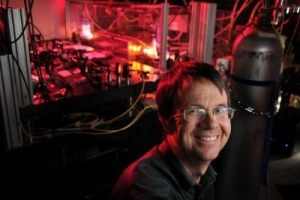Feb 21 2014
Honeywell today brought Nobel Laureate Eric A. Cornell to Centro de Ensenanza Tecnica y Superior (CETYS) University, Mexicali, for a two-day program of inspirational exchanges with students and faculty.
 Honeywell today brought Nobel Laureate Eric A. Cornell to CETYS University, Mexicali, for a two-day program of inspirational exchanges with students and faculty. (PRNewsFoto/Honeywell)
Honeywell today brought Nobel Laureate Eric A. Cornell to CETYS University, Mexicali, for a two-day program of inspirational exchanges with students and faculty. (PRNewsFoto/Honeywell)
Organized by Honeywell Hometown Solutions through its Honeywell Initiative for Science & Engineering (HISE), the visit aims to cultivate and inspire the next generation of scientists and engineers and provide an opportunity for students to interact with laureates as well as technology leaders from Honeywell.
Professor Cornell received the 2001 Nobel Prize in physics for the achievement of Bose-Einstein condensation in dilute gases of alkali atoms, which is the cooling down of gases to a millionth of a degree above Absolute Zero. This new state of matter, called Bose-Einstein Condensate, allows scientists to study the properties of atoms in a suspended state. The name comes from Indian researcher Satyendra Bose and Albert Einstein, whose combined ideas predicted the new state of matter.
As a result of this discovery in 1995, there has been an explosion in experimental and theoretical science. For example, in 1998 scientists were able to slow the speed of light traveling through a Bose-Einstein Condensate, opening the way to new types of light-based telecommunications, optical storage of data, and quantum computing. Other potential applications for Bose-Einstein Condensate include quantum information processing, and developing precision measurements for some of the world's most sensitive devices, such as an atomic clock.
During his visit to the CETYS campus, Cornell shared experiences of his long and distinguished scientific career, offering students advice on how they can follow their goals upon graduation.
"Pursue the career path that truly interests you, not one that you think will win an award," he told more than 2,500 students and faculty, including many who viewed the event through live streaming at university campuses in Mexico and Puerto Rico. "Success often happens unexpectedly, and to deliberately set out on a career because you think you can be the next laureate is an approach that will likely lead to disappointment."
"At CETYS University, we are committed to developing well rounded, globally competitive leaders in a rapidly evolving world for the economic, social, and cultural improvement of Mexico," said Fernando Leon Garcia, President, CETYS University. "Our strong partnership with Honeywell, involving the strategic cultivation and preparation of talent, academic exchanges, R&D and internships, as well as high-visibility programs like HISE, helps students see the possibilities of their future."
Luis Sanchez, President, Honeywell Mexico, noted, "Honeywell is committed to investing in the next generation of engineers. The students at CETYS represent the next wave of innovators, scientists and engineers who will create new industries, better standards of living, and a brighter future for Mexico and the world. Programs like HISE are a critical component to inspiring these students to pursue careers in science and engineering and make a positive impact on the world in the years to come."
Through HISE, Honeywell partners with top universities in China, Czech Republic, India, Mexico and other high growth regions to inspire students to pursue careers in science and engineering. The initiative includes a series of lectures by laureates, career discussions with Honeywell's top engineers in the region, and informal and interactive exchanges between the laureates and students.
CETYS University is one of two Mexican universities selected to take part in the HISE program, along with Universidad Autonoma de Baja California. To date, Honeywell has brought the program to Mexico four times. In addition, Honeywell sponsors scholarships, research and development projects, and intern opportunities for students.
Cornell is a physicist with the National Institute of Standards and Technology (NIST). He is also professor adjoint in the Physics Department of the University of Colorado, and Fellow of Joint Institute for Laboratory Astrophysics (JILA), a joint institute of NIST and the University of Colorado.
Cornell's work on Bose-Einstein Condensation has been recognized by a number of awards, including the Samuel Wesley Stratton Award from NIST, the Zeiss Award in Optics, the Department of Commerce Gold Medal, the Fritz London Award for low temperature physics, the Rabi Prize of the American Physical Society, the 1997 King Faisal International Prize for Science, the 1998 Lorentz Medal, the 1999 Benjamin Franklin Medal in Physics. In 2000, Cornell was elected as a Fellow of the Optical Society of America and a Member of the National Academy of Sciences. He shares the 2001 Nobel Prize in physics with Carl Wieman and Wolfgang Ketterle.